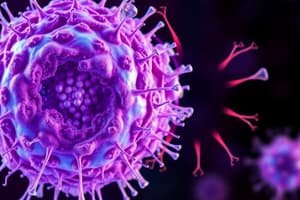Podcast
Questions and Answers
What is the primary function of the mitochondria in eukaryotic cells?
What is the primary function of the mitochondria in eukaryotic cells?
- Genetic material storage
- Protein synthesis
- Photosynthesis
- Cellular respiration (correct)
Which of the following structures is responsible for packaging proteins and lipids in eukaryotic cells?
Which of the following structures is responsible for packaging proteins and lipids in eukaryotic cells?
- Golgi apparatus (correct)
- Nucleus
- Lysosomes
- Ribosomes
Which type of cell lacks a nucleus?
Which type of cell lacks a nucleus?
- Eukaryotic cells
- Prokaryotic cells (correct)
- Plant cells
- Animal cells
What is the significance of the cell membrane?
What is the significance of the cell membrane?
Which process includes both mitosis and meiosis?
Which process includes both mitosis and meiosis?
Which organelle is specifically involved in photosynthesis?
Which organelle is specifically involved in photosynthesis?
Cells can increase in size and number during which of the following processes?
Cells can increase in size and number during which of the following processes?
What role does the cytoskeleton play in eukaryotic cells?
What role does the cytoskeleton play in eukaryotic cells?
Study Notes
Cell Biology: The Building Blocks of Life
- Cell biology, also known as cellular biology or cytology, is the study of cells – the basic unit of life.
- All living organisms are composed of cells.
The Basic Unit of Life
- A cell is the smallest structure capable of carrying out life’s essential processes:
- Growth: Cells increase in size and number.
- Reproduction: Cells divide to produce more cells.
- Metabolism: Cells convert energy from food into usable forms.
- Response to stimuli: Cells react to changes in their environment.
Types of Cells
- There are two main types of cells:
- Prokaryotic Cells:
- Simpler and smaller in size.
- Lack a nucleus.
- Examples: Bacteria, Archaea.
- Eukaryotic Cells:
- More complex and larger in size.
- Possess a membrane-enclosed nucleus.
- Examples: Plants, animals, fungi, protists.
- Prokaryotic Cells:
Key Components of a Cell
- Both prokaryotes and eukaryotes share essential components:
- Cell membrane: A thin, flexible barrier surrounding the cell, regulating the movement of substances in and out.
- Cytoplasm: A jelly-like substance filling the cell and containing organelles.
- DNA: The genetic material carrying instructions for cell growth and function.
Eukaryotic Cell Organelles
- Eukaryotic cells have specialized structures called organelles that perform specific functions:
- Nucleus: Contains DNA and controls cell activities.
- Mitochondria: The cell’s powerhouse, responsible for cellular respiration (energy production).
- Chloroplasts: Found in plant cells, responsible for photosynthesis (converting sunlight into energy).
- Endoplasmic reticulum (ER): A network of membranes involved in protein and lipid synthesis.
- Golgi apparatus: Processes and packages proteins and lipids.
- Lysosomes: Contain enzymes to break down cellular waste and debris.
- Ribosomes: Sites of protein synthesis.
- Cytoskeleton: A network of fibers providing structural support and facilitating cell movement.
Cell Processes
- Cells undergo various processes to maintain life:
- Cell division: The process of cell reproduction, including:
- Mitosis: For growth and repair.
- Meiosis: For sexual reproduction.
- Cell metabolism: The chemical reactions occurring within cells to convert energy from food into a usable form.
- Protein synthesis: The process of creating proteins based on DNA instructions.
- Cell signaling: Communication between cells, vital for coordinating cellular activities.
- Cell division: The process of cell reproduction, including:
Importance of Cell Biology
- Understanding cell biology is crucial for:
- Medical research: Developing treatments for diseases like cancer and genetic disorders.
- Biotechnology: Creating new drugs and vaccines.
- Agriculture: Improving crop yields and resistance to pests and diseases.
- Environmental science: Studying pollution’s impact on ecosystems.
- By studying cell biology, scientists can gain insights into fundamental life processes and work towards improving human health and the environment.
Studying That Suits You
Use AI to generate personalized quizzes and flashcards to suit your learning preferences.
Description
Explore the fundamental concepts of cell biology, including the types of cells and their essential functions. This quiz covers the basic unit of life, cell types, and key components necessary for understanding cellular processes. Test your knowledge on the building blocks of life!




